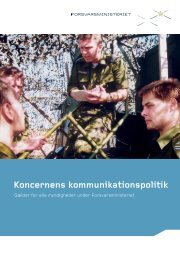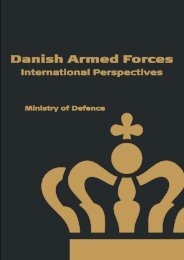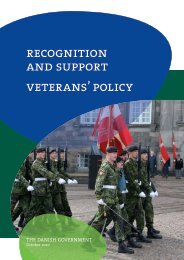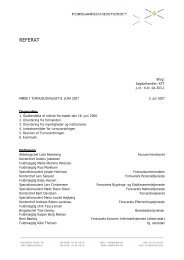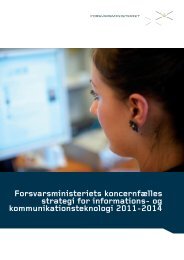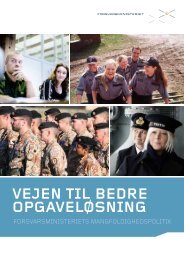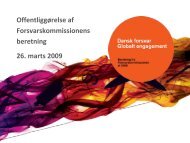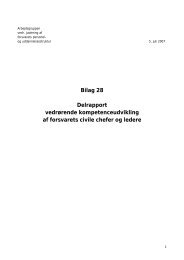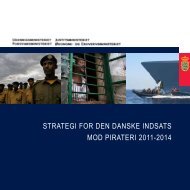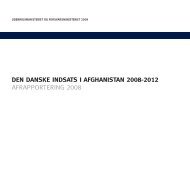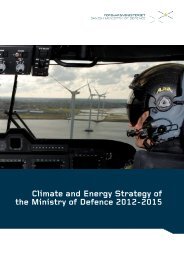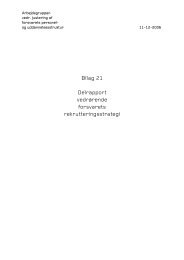Afghanistan Report 2009 - Isaf - Nato
Afghanistan Report 2009 - Isaf - Nato
Afghanistan Report 2009 - Isaf - Nato
Create successful ePaper yourself
Turn your PDF publications into a flip-book with our unique Google optimized e-Paper software.
<strong>Afghanistan</strong> <strong>Report</strong> <strong>2009</strong><br />
AFGHAN SOCIAL OUTREACH PROGRAMME ( ASOP )<br />
<strong>Afghanistan</strong> Social Outreach Programme is a practical example of a comprehensive and<br />
integrated approach to peace, governance and development in the country. Through this<br />
programme the Government was able to increase citizens’ role and participation in security,<br />
governance and development. ASOP is built upon existing Afghan structures through<br />
which the Government can empower local communities to watch-dog the performance of<br />
the Government, reform and improve the traditional structures, expand and practice<br />
democracy at grass-root level so that people’s voices are heard and to ensure that security,<br />
development and governance are sustained and maintained by Afghans.<br />
Governor Mohammad Halim Fidai, Maidan Wardak Province, February <strong>2009</strong><br />
Objectives<br />
• Improve government outreach at district level for<br />
both stability and development;<br />
• Produce provincial profiling reports encompassing<br />
general information, governance, structures,<br />
security trends and development scenarios;<br />
• Sensitise key government officials and political<br />
and social figures on critical issues in the province<br />
concerning the Government and community<br />
through extensive consultation;<br />
• Create/strengthen confidence between the community<br />
and the Government by the revival of traditional<br />
practices ( e.g. conflict resolution among<br />
communities ) through establishing temporary<br />
community councils comprising 30-50 members<br />
of the village leaders, religious scholars, political<br />
and social leaders and tribal heads;<br />
• Strengthen community-based decision-making<br />
processes to create a conducive environment<br />
for government and other actors to address<br />
immediate and long-term needs, ensuring quality<br />
output delivery by the government and aid<br />
organisations, handling the social grievances and<br />
responding to emergency situation in a collective,<br />
effective and timely manner;<br />
Progress in Maidan Wardak 15<br />
• Prepared a provincial profile – a comprehensive<br />
document on security, good governance and<br />
development priorities for the province;<br />
• Identified potential District Council members<br />
from suggestions provided through the Provincial<br />
Profile, District Governors, Provincial Governor,<br />
National Directorate for Security and NGO<br />
database;<br />
• Established eight District Councils through<br />
collective concensus-based decision-making<br />
processes;<br />
• Created a strong and effective leadership team<br />
comprised of the Governor, provincial Assembly,<br />
District Councils and National Assembly<br />
members;<br />
• With the progress on the District Councils,<br />
community representatives have gained greater<br />
confidence to participate actively and people<br />
became more willing to express their opinions<br />
and convey their concerns;<br />
• The Community Councils meetings provided<br />
useful fora for dialogue and addressing community<br />
grievances with government services.<br />
• Synchronise all programme implementation<br />
in the districts for increased effectiveness and<br />
efficiency. 14<br />
14<br />
IDLG.<br />
15<br />
SCR Office (ASOP Lessons Learned) and Governor Fidai<br />
presentation to journalists, December 2008.<br />
25



